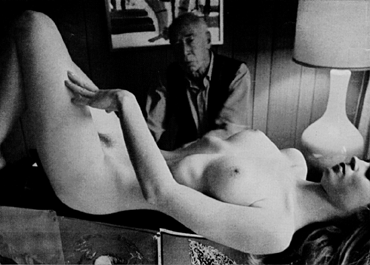In any case, I only like confessions nowadays, and the authors of confessions write chiefly in order not to confess, saying nothing of what they know. When they pretend to be owning up, that’s the moment to beware: they’re putting make-up on the corpse.
As far as his prose-fiction output goes, Camus is most well-known for three works: The Stranger The Plague and this one, The Fall. The first two have definitive places amongst cycles of his work within his oeuvre and the development of his ideas: the Absurd and Revolt respectively. But the The Fall does not. It wasn’t even part of the planned third cycle—Love—that was never completed due to Camus’ accidental death. It was a short story that grew into a novella, and was published separately to the other short stories that were put together as Exile and the Kingdom.
Let me firstly say that, of the three theatrical versions of Camus’ work that I have witnessed, it is Drew Tingwell’s performance as Jean-Baptiste Clamence, in Michael Cronin’s adapted-for-the-stage version of this book, that has most occupied a Camus protagonist for me during my rereading of his work this year. I could visualize him delivering some of the key lines, like:
But let me introduce myself: Jean-Baptiste Clamence, at your service. Delighted to meet you. You must be in business? More or less? Excellent reply. Judicious too: we’re only more or less in anything.
Maybe because it is so suitable for a one-man-show? I mean, as a novel, it is a one man show… Anyway, he seems to occupy Clamence for me now in a way that the actors who played Meursault and Rieux do not.
This novella is a confession, and a confession about the nature of confessions and what they mean. How they work for us. Why they’re necessary. What makes someone guilty, what makes someone innocent, in a specific and a general sense. Clamence adopts the role of Judge-penitent, a role he does not explain completely until the very end of the story. We, the reader, the nameless companion in the bar and streets and houses of Amsterdam, occupy the role of hearing the confession of this fallen man. And he pokes us along at a pretty brisk rate, often teasing us with information that is still-to-come.
We follow his progression as a lawyer defending those who need to be, but always on ‘the right side’. He is beyond reproach, and he enjoys this position immensely… To be above, looking down. But an event occurs, mirroring, very gently, an event that occurred in Camus’ life, that causes a breakdown in the character of Clamence, a questioning of himself, a sense of guilt that was always there, that should always have been there, but he had resisted. And he feels the judgement of all around him. He regularly hears phantom laughter that comes from nowhere.
Later, talking about Jesus, he finds room to condemn Him as guilty, even before he’s born. No lamb, He…
And then he went away forever, leaving them to judge and condemn, with a pardon on their lips and a sentence in their hearts.
In some ways, as Robin Buss’s introduction touches on nicely, Camus is responding to the Paris intellectuals who froze him out over his inconsistent politics … inconsistent in the sense that Camus wasn’t ever happy to accept any manifesto as unquestionable blueprint for Life. This novella is his response, an appropriately literary response that assaults his ‘enemies’, while at the same time does not absolve himself.
Bistro atheists at work...
And while this is an interesting historical and biographical point, Camus reaches much further. You can easily cast contemporary roles for the ‘bistro atheists’ he talks about.
They’re free, so they have to get by as best they can; and since, most of all, they don’t want any freedom, or sentences, they pray to have their knuckles rapped, they invent dreadful rules and they rush to build pyres to replace churches
Camus is an atheist, but, he cannot so easily jettison the depth of moral consideration and conviction of Christian theology … not when he mistrusts the purposes and ‘paydays’ of what is offered in replacement, and Clamence expresses some of that, but always with apology.
In short, you see, the main idea is not to be free any longer, but to repent and obey a greater knave than you are.
If Meursault is the Outsider, then Clamence is the Insider. The Outsider ascends to death on innocence, the Insider falls to life in guilt.
Aren’t we all the same, continually talking, addressing no-one, constantly raising the same questions, even though we know the answers before we start?
Clamence is the man for our times. He is our Janus, the kind we worship. He would be a celebrity now, not a lawyer, but an actor playing a lawyer on a major HBO big-budget series, the kind people talk about at water coolers and on Facebook pages. And the charitable works he would perform! You would see all on his Twitterfeed. Our age would have sustained him far longer than the 50s could…
Some mornings, I would conduct my trial to the very end and reach the conclusion that what I excelled in above all was contempt. The very people I most often helped were those I most despised.







